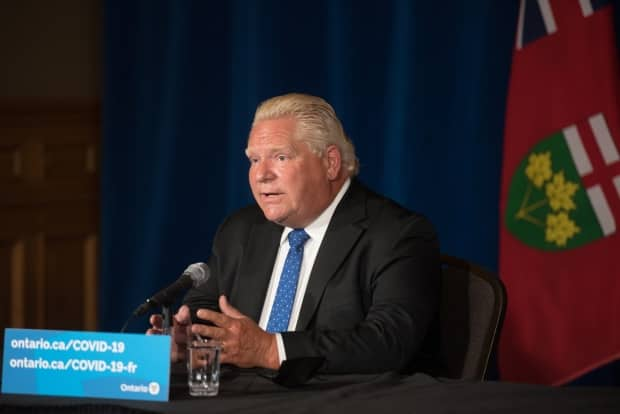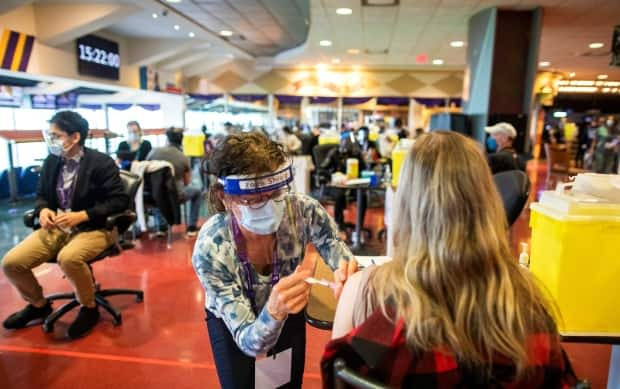Ontario's COVID-19 vaccine passport plan unveiled, won't apply to retail

Ontario residents will soon have to show proof they've been fully vaccinated against COVID-19 to dine indoors at restaurants and go to gyms and theatres — but not necessarily to enter retail locations — the province announced Wednesday.
The "enhanced COVID-19 vaccine certificate" system, as the Ontario government is calling it, will come into effect on Sept. 22.
At a news conference Wednesday, Premier Doug Ford said the new system came from "in-depth conversations" with experts based on "evidence and best advice."
"We need to protect our hospitals; we need to avoid lockdowns at all costs. We want our kids in schools, and our businesses to stay open," he said.
You can read the province's entire plan in detail at the bottom of this story.
At first, fully vaccinated Ontarians will need their current vaccination receipt with a valid photo identification to enter premises covered under the new system.
The receipts can be printed or downloaded from the provincial government website. "Fully vaccinated" here means having had two doses, with the most recent at least 14 days prior. Neither a recent COVID-19 infection nor a recent negative test will substitute for two shots, officials said at a morning briefing for media.
During the briefing, officials said the enhanced certificate system is meant to be temporary, though how long it remains in place will depend on how the fourth wave of the pandemic unfolds in coming months.
The government says that on Oct. 22, it will shift to certificates that include QR codes containing much of the same information included on the vaccination receipts that are already available. That shift will be accompanied by the release of a "verification app" that can be used to validate the QR codes and provide the vaccination status of an individual.
Officials said the purpose of the app is to relieve businesses and facilities from having to determine whether a patron has been vaccinated or not.
WATCH | Ontario officials unveil proof-of-vaccination system:
The intention is that the enhanced certificates be usable in other provinces with vaccine passport systems in place, and eventually for them to be integrated with the federal passport for international travel, officials said.
"We need to be proactive to avoid reactive closures," said Chief Medical Officer of Health Dr. Kieran Moore Wednesday. He said this also will be an incentive for more people to get vaccinated.
"Immunization is key to protect ourselves, our loved ones and our most vulnerable."
Ontario: New daily cases of COVID-19
Where will proof be needed?
The vaccine certificate system will cover "higher-risk" indoor spaces where masks can't be worn at all times, officials said. It applies to the following settings:
Restaurants and bars (excluding outdoor patios, delivery and takeout).
Nightclubs, including outdoor areas.
Meeting and event spaces like banquet halls and convention centres.
Sports and fitness facilities and gyms, with the exception of youth recreational sports.
Sporting events.
Casinos, bingo halls and gaming establishments.
Concerts, music festivals, theatres and cinemas.
Strip clubs, bath houses and sex clubs.
Racing venues.
System doesn't apply to employees
The vaccine certificate system does not apply to employees in these settings.
Essential retail, like grocery stores, are exempt, as are places of worship and hair salons, alongside other personal care businesses. Health Minister Christine Elliott stressed Wednesday that "at no time" will people be denied medical care or food from grocery stores, regardless of vaccine status.
The system also exempts children who are ineligible for vaccines (those born in 2010 and later in Ontario) and provides for personal medical exemptions that will be reflected in the impending QR codes, officials said.
The verification app will be made available to all businesses, allowing non-essential retailers not covered in the listed settings to implement their own vaccination policies for patrons, officials said.

Enforcement measures for the certificate system will fall under the Reopening Ontario Act, officials said. Businesses, facilities and individuals who refuse to comply can face fines.
There are still several critical elements of the plan under development, officials said, and more specific guidance is expected in the coming days and weeks.
Asked why retail settings are not included in this plan, Moore said that the province is trying to be as "evidence-based as possible" in its decision-making.
"The venues we have chosen are responsive to the risk we've found in Ontario," he said. If cases rise in other venues, he said more restrictions can be added.
Move comes after days of deliberations
The changes come after two days of deliberations by the premier and his cabinet. A source with knowledge of the discussions told CBC/Radio-Canada that an initial proposal readied on Monday had been rejected.
Sources said last week that some members of the Progressive Conservative cabinet were against the province implementing its own vaccine certificate system like those introduced in Quebec, B.C. and Manitoba.
Until recently, Ford and Elliott had both repeatedly said that Ontario would not follow the initiatives taken in other provinces. Earlier this summer, Ford told reporters he thought a vaccine passport would create a "split society."
The pair also insisted that the vaccine receipts currently available from the province would be a suitable alternative to a passport system.
Critics have said the receipts are susceptible to forgery, and officials at the briefing tacitly acknowledged as much, saying QR codes would be more secure.

Pressure mounting as 4th wave continues
Pressure has mounted on Ford and his government from a myriad of physicians, infectious disease specialists and business groups to institute such a system as the province navigates a fourth wave of the pandemic.
Ford said Wednesday that it is "no secret" that he "wasn't in favour of this," but he decided it was necessary based on advice from the province's medical officer of health.
"This is something that I did not want to do … I know this is going to be very difficult for some people," Ford said.
Asked why he only chose to act now after months of calls for some sort of proof-of-vaccination system, Ford pointed fingers at the federal government, saying his decision was prompted in part by the fact that there would be no national vaccine passport.
That comment from Ford drew a swift rebuke Wednesday from Bill Blair, a Liberal cabinet minister and the party's candidate for Toronto's Scarborough Southwest riding in the upcoming federal election.
"The premier has been late to announce vaccine passports in Ontario. His comment today that he asked the federal government to bring in a national vaccine passport is untrue … In fact, Premier Ford asked the federal government to stay out of domestic vaccine passports. Premier Ford has only ever asked for an international version for international travel," Blair said in a statement.
"From the very beginning, Premier Ford has made a series of errors in judgment in managing the pandemic, and the people of Ontario have had to pay the price. Ontarians know that."
Business group disappointed
In a statement issued after Ford's news conference, the Canadian Federation of Independent Business (CFIB) said the province's announcement provides some clarity on a new system for small business owners, but also leaves many concerns and questions unanswered.
Chief among them, the statement says, are issues around fraud, enforcement, training for businesses that have to check credentials, and how shops will recognize out-of-province and out-of-country vaccinations.
The CFIB also said that it is "disappointing" that the province is adding more requirements without first removing capacity restrictions for businesses.
It is calling on the government to provide additional aid to businesses to offset costs that may be incurred by the new rules.
Risk higher for unvaccinated people, officials say
Millions of students in Ontario are also set to return to classrooms next week, with children born in 2010 and later still not eligible to be vaccinated against the virus. The highly infectious delta variant continues to circulate in Ontario, although indicators show its spread has slowed in recent weeks.
As of Tuesday, 76.4 per cent of eligible Ontarians had received two doses of COVID-19 vaccines, or roughly 67.7 per cent of the province's total population.
Officials said today the latest data suggests that unvaccinated people have a seven-fold higher risk of developing COVID-19 symptoms than those with both shots. Moreover, unvaccinated people have a 27-fold higher risk of ending up in hospital and a 42-fold higher risk of needing intensive care.
Dr. Isaac Bogoch, an infectious disease specialist in Toronto and former member of Ontario's now-disbanded COVID-19 vaccine distribution task force, applauded the introduction of a passport system but cautioned that it is not a panacea for ending the pandemic.
"Vaccine passports will not end the pandemic. They will not create perfectly safe indoor spaces," he said in a series of Twitter posts. "They are an added layer of protection to help create safer indoor spaces."

